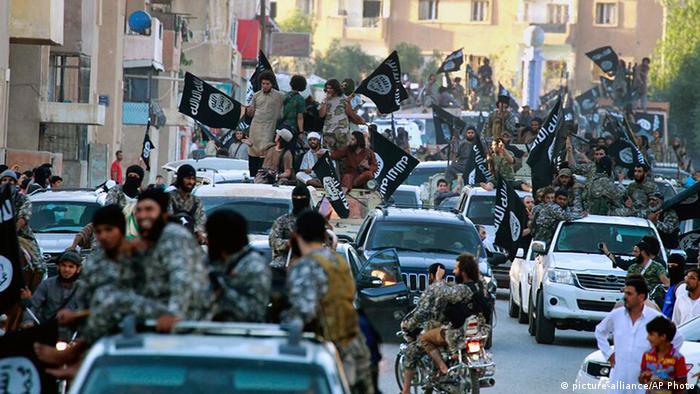Despite military defeat in the region, the "Islamic State" militant group can still "mount attacks inside Syrian territory," according to a UN report. In Iraq, the group "remains active" hiding out in desert areas. A report by UN sanctions monitors published Monday said the "Islamic State" (IS) militant group has between 20,000 and 30,000 fighters still in Iraq and Syria. Despite major military setbacks and a near-halt on foreign fighters joining their ranks, the group continues to maintain a sizable presence "roughly equally distributed between the two countries," said the report. "Among these is still a significant component of the many thousands of active foreign terrorist fighters," it added.
'Still able to mount attacks'
The group is "still able to mount attacks inside Syrian territory," the report noted. "It does not fully control any territory in Iraq, but it remains active through sleeper cells."
While many of IS' funding channels have been cut off, it continues to hold sway in small territories in northeastern Syria, allowing its operatives to eke out a living through oil revenues.
According to the UN, the number of foreign fighters "remains lower than expected," but "significant numbers have made their way to Afghanistan," including senior figures.

WHAT IS THE 'ISLAMIC STATE'?
Where did it come from?
The "Islamic State" (IS) — also known as ISIL, ISIS and Daesh — is an al-Qaida splinter group with a militant Sunni Islamist ideology. It emerged in the aftermath of the US-led invasion of Iraq in 2003 and is led by Abu Bakr al-Baghdadi. Their goal is to create a worldwide "caliphate." It gained worldwide notoriety in 2014 after a blitzkrieg military campaign that resulted in the capture of Mosul.
Victory?
Last year, Iraqi Prime Minister Haider al-Abadi declared military victory over IS, saying Iraqi forces had "reached the final strongholds of Daesh [IS] and purified it." That year, Iraqi forces liberated Mosul, where IS leader Abu Bakr al-Baghdadi declared a so-called caliphate in 2014.
In Syria, the US-backed Syrian Defense Forces (SDF) last year ousted IS from its de facto capital, Raqqa, seizing much of the territory the militant group had captured in 2014. But the fight against IS has since slowed down, likely due to other developments in the Syrian conflict.
Despite military defeat in Iraq and Syria, the militant group continues to exert influence in other areas, including Afghanistan, the Sahel and Libya, where the UN estimates it has up to 4,000 fighters.
Although the al-Qaida-linked al-Shabab militant group maintains a strong presence in Somalia, IS "has the strategic intent to expand to central and southern Somalia." Observers have warned that although the group may one day disappear, its ideology is likely to endure.
No comments:
Post a Comment